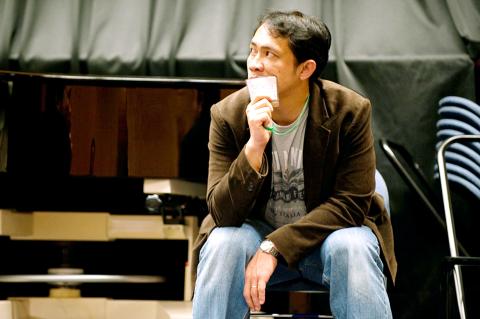“You’re just selfish. Get out!” the drummer of Aboriginal indie-rock band Totem (圖騰) screams at one of the group’s singers. The guitarist steps in to prevent the two from fighting. Audiences could be forgiven for thinking the band was going the way of the Sex Pistols, but Amis director Lungnan Isak Fangas (龍男‧以撒克‧凡亞思) staged the quarrel to “tease out the real emotions” in his latest “documentary,” which follows the group as it tries to make it big.
Fangas started the project after meeting Totem while filming 2004’s Ocean Fever (海洋熱), a documentary about Ho-Hai-Yan Rock Festival’s (國際海洋音樂祭) battle of the bands competition.
“Over the years I have seen Totem growing apart and its members complaining about each other, so I thought it was better to touch on a universal theme rather than just about the band,” the director said. “In talking-head documentaries, people exert constraints and exercise caution in front of the lens, whereas I want to reveal truth through drama ... I exaggerate those conflicting emotions and ask the documentary’s subjects to internalize them through each gesture they make and each word they say in what is mostly improvised performance.”

Photo: Courtesy of Good Day Films
The film interweaves scenes of the staged conflict, which is set in 2009, and the footage Fangas shot between Totem’s inception in 2003 and 2005, when the band won the contest at Ho-Hai-Yan.
As the off-screen narrator, lead singer Suming’s (舒米恩) viewpoint shapes the rock outfit’s past and present, gradually pulling audiences into the struggles of the aspiring musicians who quit their jobs to prepare for the contest.
Tension mounts among the band members and explosive confrontations follow, with drummer A-sheng (阿勝) accusing Suming of “double-crossing” the band because of his participation in Echo GS (艾可菊斯), a side project the Amis singer and songwriter formed with Rukai musician Gelresai (陳世川).

Photo: Courtesy of Good Day Films
Director Fangas’ effort to blur the line between documentary and fiction leaves room for narrative development, as the two segments appear tacked together, rather than forming an integral whole.
Lacking funding, the film was a labor of love for Fangas, who formed close bonds with the musicians.
The result is a strong sense of intimacy and trust, even during the film’s tenser moments, one of which involves a very natural “performance” by A-sheng, who tells Suming he has to quit the band to support his family, despite the fact that audience members know he plays drums with the band Matzka (瑪斯卡樂團), which is recently enjoying growing popularity.

Photo: Courtesy of Good Day Films
Fangas said he has been working on a feature-film project that will morph into an Amis musical, though Aboriginal culture is not his only area of interest.
“I keep my Han Chinese name Lungnan because that is how I am: a mix of Han Chinese culture and Amis inheritances,” the director says.
Fangas has also found inspiration in his position as presidential hopeful Su Tseng-chang’s (蘇貞昌) son-in-law. Still in production, this documentary follows the life of Fangas’ wife, a woman torn between her family and helping her father attain political office.
“It is a universal theme that all women can relate to,” the director says. “But, of course, it is also an elaborate piece of propaganda to make Su look good.”
Who is Singing There is currently on a free screening tour across the country. Its next stop is Kafka on the Shore Cafe (海邊的卡夫卡) tomorrow at 7pm in Taipei. Totem members Zamake (胡祝凱) and A-shin (阿新) will perform after the screening and along with the director will hold a question-and-answer session. For more information about the film, visit singingthere.pixnet.net/blog.

April 14 to April 20 In March 1947, Sising Katadrepan urged the government to drop the “high mountain people” (高山族) designation for Indigenous Taiwanese and refer to them as “Taiwan people” (台灣族). He considered the term derogatory, arguing that it made them sound like animals. The Taiwan Provincial Government agreed to stop using the term, stating that Indigenous Taiwanese suffered all sorts of discrimination and oppression under the Japanese and were forced to live in the mountains as outsiders to society. Now, under the new regime, they would be seen as equals, thus they should be henceforth

Last week, the the National Immigration Agency (NIA) told the legislature that more than 10,000 naturalized Taiwanese citizens from the People’s Republic of China (PRC) risked having their citizenship revoked if they failed to provide proof that they had renounced their Chinese household registration within the next three months. Renunciation is required under the Act Governing Relations Between the People of the Taiwan Area and the Mainland Area (臺灣地區與大陸地區人民關係條例), as amended in 2004, though it was only a legal requirement after 2000. Prior to that, it had been only an administrative requirement since the Nationality Act (國籍法) was established in

With over 80 works on display, this is Louise Bourgeois’ first solo show in Taiwan. Visitors are invited to traverse her world of love and hate, vengeance and acceptance, trauma and reconciliation. Dominating the entrance, the nine-foot-tall Crouching Spider (2003) greets visitors. The creature looms behind the glass facade, symbolic protector and gatekeeper to the intimate journey ahead. Bourgeois, best known for her giant spider sculptures, is one of the most influential artist of the twentieth century. Blending vulnerability and defiance through themes of sexuality, trauma and identity, her work reshaped the landscape of contemporary art with fearless honesty. “People are influenced by

The remains of this Japanese-era trail designed to protect the camphor industry make for a scenic day-hike, a fascinating overnight hike or a challenging multi-day adventure Maolin District (茂林) in Kaohsiung is well known for beautiful roadside scenery, waterfalls, the annual butterfly migration and indigenous culture. A lesser known but worthwhile destination here lies along the very top of the valley: the Liugui Security Path (六龜警備道). This relic of the Japanese era once isolated the Maolin valley from the outside world but now serves to draw tourists in. The path originally ran for about 50km, but not all of this trail is still easily walkable. The nicest section for a simple day hike is the heavily trafficked southern section above Maolin and Wanshan (萬山) villages. Remains of